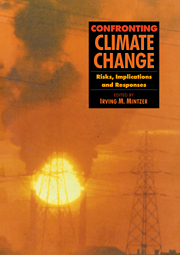Book contents
- Frontmatter
- Contents
- Foreword
- Acknowledgements
- List of Reviewers
- 1 Living in a Warming World
- I The Science of Climate Change
- II Impacts of Global Climate Change
- III Energy Use and Technology
- IV Economics and the Role of Institutions
- 15 The Economics of Near-Term Reductions in Greenhouse Gases
- 16 “Wait and See” versus “No Regrets”: Comparing the Costs of Economic Strategies
- 17 International Organisations in a Warming World: Building a Global Climate Regime
- 18 Modifying the Mandate of Existing Institutions: NGOs
- 19 Modifying the Mandate of Existing Institutions: Corporations
- 20 International Trade, Technology Transfer and Climate Change
- V Equity Considerations and Future Negotiations
- Annex I
- Annex II
- Glossary
- Index
20 - International Trade, Technology Transfer and Climate Change
Published online by Cambridge University Press: 06 January 2010
- Frontmatter
- Contents
- Foreword
- Acknowledgements
- List of Reviewers
- 1 Living in a Warming World
- I The Science of Climate Change
- II Impacts of Global Climate Change
- III Energy Use and Technology
- IV Economics and the Role of Institutions
- 15 The Economics of Near-Term Reductions in Greenhouse Gases
- 16 “Wait and See” versus “No Regrets”: Comparing the Costs of Economic Strategies
- 17 International Organisations in a Warming World: Building a Global Climate Regime
- 18 Modifying the Mandate of Existing Institutions: NGOs
- 19 Modifying the Mandate of Existing Institutions: Corporations
- 20 International Trade, Technology Transfer and Climate Change
- V Equity Considerations and Future Negotiations
- Annex I
- Annex II
- Glossary
- Index
Summary
Editor's Introduction
As the world emerges from the Cold War into a new multipolar era, international trade relationships will be realigned in fundamental ways. The Uruguay Round of talks on the General Agreement on Tariffs and Trade will set many new precedents which can affect intellectual property rights, mechanisms for technology transfer, and financial flows between North and South. The concurrent discussions leading to a framework convention on climate change will touch on many of the same issues.
In this chapter, Konrad von Moltke explores the linkages between the policy dialogue on climate change and the current negotiations on international trade regimes. His analysis begins with a review of the historical separation between these discussions, and between the communities that participate in them. He then evaluates the potential implications that these complex debates may have on each other; and identifies ways in which sound trade policies can support the principal goal of the climate negotiations — establishing a cooperative regime to reduce the risks and the ultimate damages due to rapid climate change.
von Moltke's analysis suggests that it is possible to achieve simultaneously the separate objectives of these two negotiations. But achieving both objectives will require an act of courage — to supplement the current international trade goal of economic efficiency with an added criterion. The design of trade incentives and barriers should reward actions which benefit all countries: increased efficiency in the use of resources, especially the resources that are key to the risks of climate change.
- Type
- Chapter
- Information
- Confronting Climate ChangeRisks, Implications and Responses, pp. 295 - 304Publisher: Cambridge University PressPrint publication year: 1992
- 1
- Cited by



